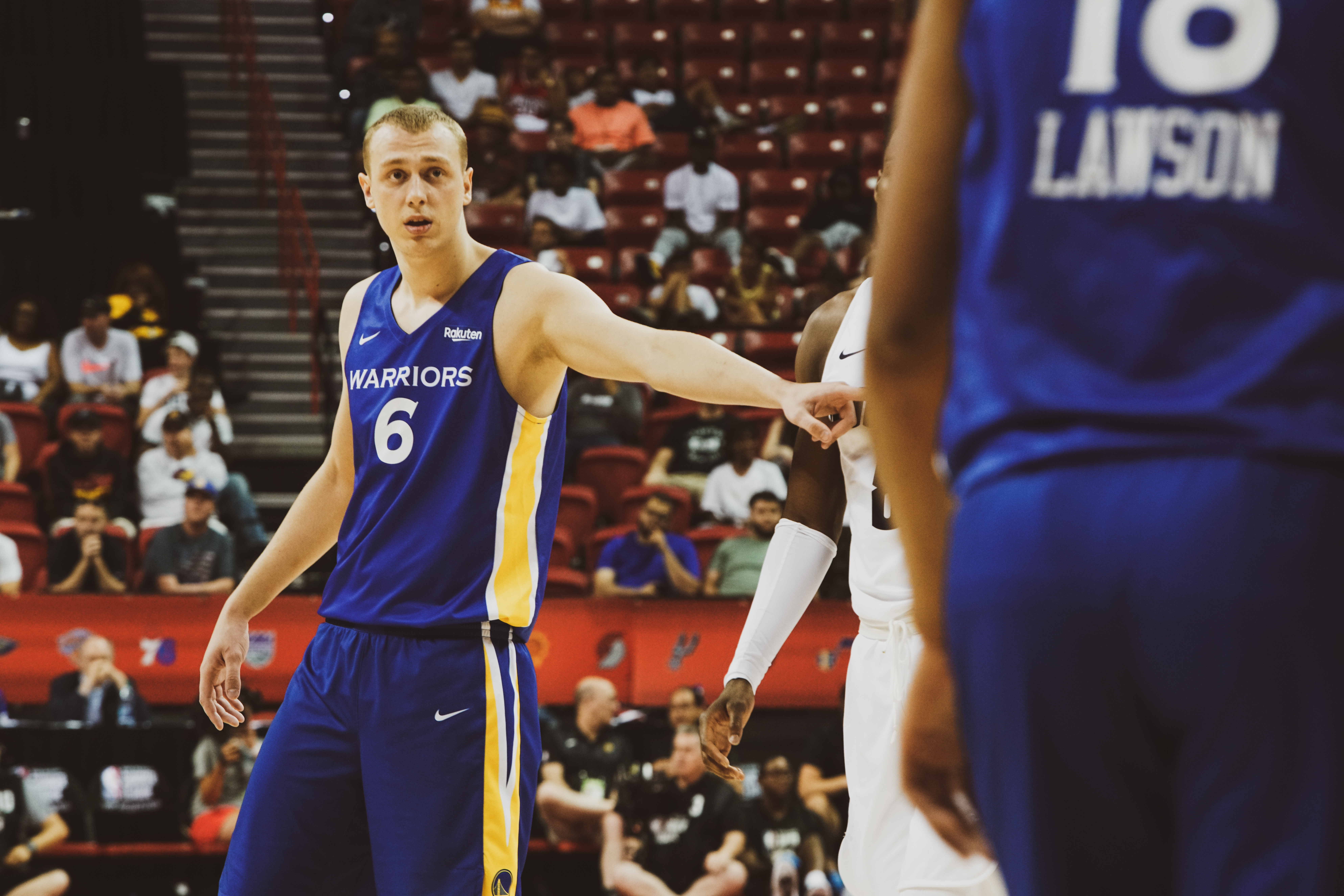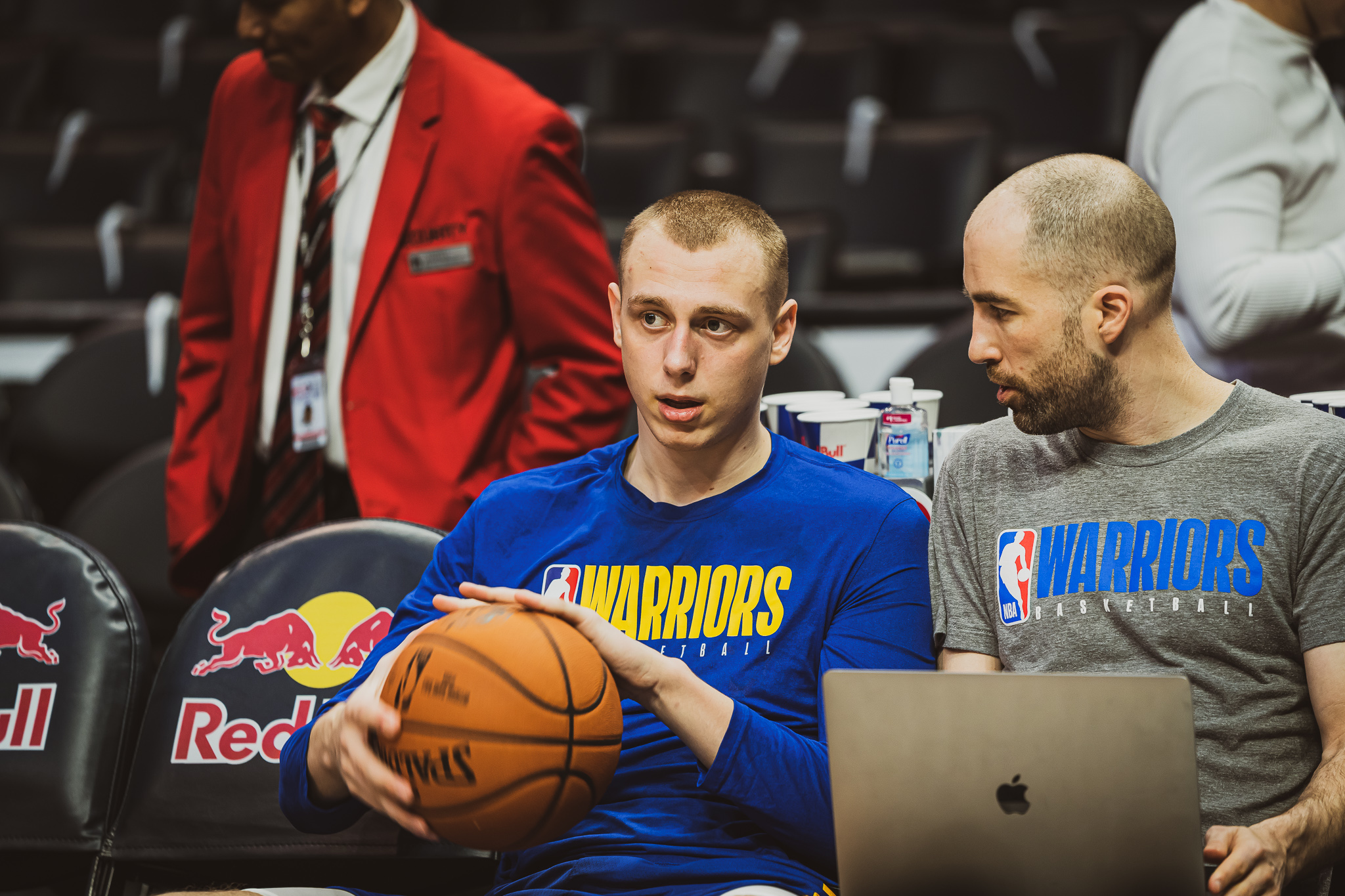
‘He’s Fearless’: Warriors Rookie Alen Smailagic Pioneers Path Through G League to NBA
LOS ANGELES -- Two months after the coronavirus brought the 2019-20 NBA season to a halt, basketballs are starting to bounce again in the Association. The league is allowing teams in places where stay-at-home orders are easing to let players back into their training facilities.
Not for practices or scrimmages. Not even for group workouts. Just for voluntary individual workouts, with precautions in place to protect against the spread of the virus.
That allowance currently excludes a number of teams, including the Golden State Warriors. San Francisco, where the Warriors’ Chase Center (and the Biofreeze Performance Center within it) sits, is under stay-at-home orders in place until the end of May.
Which means, for the time being, Stephen Curry won’t be splashing jump shots there. Nor will Klay Thompson be waking up his sleeping stroke, or Draymond Green be filling its confines with competitive bravado.
While those All-Stars remain sheltered in place with their loved ones, on Bay Area estates built by the millions earned from their championship triumphs, Alen Smailagic is wiling away his quarantine in the more modest (but still comfortable) confines of his San Francisco apartment. When he’s not working out, either on his own or with teammates over Zoom, he’s usually reading or working on his English—which he started studying nearly three years ago in his native Serbia.
For Alen, there are worse places to be stuck, worse situations to be stuck in. Granted, he’s much further from the nearest Chili’s here than he would’ve been back in Santa Cruz, where the chain restaurant became a staple of his G League diet. He’s also much further from his family back in Belgrade.
Alen didn’t expect to be here, stuck by himself in San Francisco, nearly 6,300 miles from home. Nor did he think he’d be here, in the NBA.
Not this soon, anyway.

Golden State Warriors rookie Alen Smailagic has been quarantined inside his San Francisco apartment during the NBA's coronavirus shutdown. (Zach Schmidt)
Alen is far from the first Serbian to set foot in the NBA. He is, however, the first of his countrymen to do so who was born after the war that led to the breakup of Yugoslavia.
His life was no less shaped by the conflict, indirectly or otherwise. In 1994, Alen’s father, Rustem, fled Belgrade to find work as an electrician (and a modicum of safety) in Russia. Three years later, Rustem returned to Serbia, where he met a woman named Nermina, who would become his wife. Three years after that, Rustem and Nermina welcomed Alen, their first child, into a world that, while not as turbulent as the one left behind in the 1990s, remained unstable in the wake of vicious ethnic and sectarian conflict.
In the years that followed, Alen and his younger sister, Adela, were raised in a Muslim family in Kotez, a neighborhood in Belgrade known as much for the drugs and violence in its streets as its emerging hip-hop scene.
“You see a lot of things,” Alen tells CloseUp360. “You know what's bad, what's not bad. And like, that's good if you know how to control it. It's bad if you don't know.”
Rustem worked 12 hours a day, seven days a week to provide for his family while Nermina cared for the kids at home. But there was only so much the couple could do to shield Alen and Adela from their surroundings. That the family lived so close to a prison and a mental institution wouldn’t appear to help matters.
But nestled between those facilities was a nondescript basketball court. It was there that Alen often plied what would become his trade, with Rustem rebounding when work breaks allowed him to do so.
“Basketball saved me,” Alen says.
When Alen was seven, Rustem took his son to KK Beko, a local basketball club with a youth program run by one of the family’s neighbors. As serious as the surroundings were, the atmosphere inside KK Beko was anything but at first.
“We were doing everything except basketball,” Alen says. “Because we were so young, we didn't know nothing else. The ball was too heavy for us.”
Nonetheless, Alen found a joyous escape with KK Beko. There, he could run up and down the dilapidated court, bouncing a ball with friends all the while.
Over time, Alen’s appreciation and aptitude for the game grew, along with his body. When he wasn’t practicing with the club, he could often be found honing his skills at that seemingly suspect court near the high-rise apartment building where his family lived.
By the age of 12, Alen was flashing a precocious combination of skill, athleticism and fluidity in organized competitions with KK Beko. Those talents drew the attention of the Serbian national team, which called him into its ranks two years later.
“I saw then, I'm, like, I'm good at this, maybe I can [make it],” Alen says.
At that point, he started to take the game more seriously. Perhaps basketball could be the ticket to a better life for Alen and his family.
By the spring of 2017, Alen, then all of 16 years old, had officially landed on the NBA’s radar.
A pair of officials from the Warriors—including Kirk Lacob, the team’s assistant general manager and son of majority owner Joe Lacob—happened to step into a decrepit gym north of Belgrade to scout another player when they laid eyes on a 6’6” forward with silky guard skills.
That forward was Alen.
From there, word filtered back to the U.S. about this talented teenager who was outshining the competition in the First Men’s Regional League, the semi-professional third tier of Serbian basketball. Among those who caught wind of Alen was Jason Ranne, the chief operating officer and executive vice president of talent at Wasserman. Jason had already helped two other Serbian stars, Nemanja Bjelica and Bogdan Bogdanovic, navigate the transition to the NBA. He was intrigued enough by what he heard to go see Alen himself, and saw enough from Alen to sign him as a client.
The goal was to get Alen to the NBA. But between the league’s age requirement for draft eligibility and his lack of high-level experience overseas, that path would be tricky to traverse.
Fortunately, another avenue opened up in 2018. That summer, the G League announced that it would allow any prospects who turned 18 by September 15 to enter its draft. Alen would beat that deadline by nearly a month.
Still, never had an 18-year-old entered the G League draft. And while international prospects had long since become commonplace in the NBA draft, no one had ever tried to make the leap from overseas to the G League or its predecessor, the D-League, by way of the draft.
“I [was] just, like, why not? Let's try it,” Alen recalls. “If I'm lucky, I'm lucky. If I'm not, I'm gonna get back to Europe.”
Alen figured he would spend two or three years in the G League before trying his luck in the NBA draft. Between his own youth and lack of experience with both the American game and life off the court, he figured he would need time to adapt.
Alen’s family was onboard, though they didn’t quite know what to expect. And how could they? Nobody had ever done what Alen was attempting to do.
So, on October 20, Alen awaited his fate. With the first pick in the 2018 G League draft, the Salt Lake City Stars selected former NBA veteran Willie Reed. Three spots later, the South Bay Lakers chose Alen before trading his draft rights to the Santa Cruz Warriors.
It was official: Alen would be not only leaving Serbia for the first time, but also doing so to chase his dream in America.
Alen had done what he could to get ready for a future in the U.S. The year before he arrived, he started studying English once a week in Serbia.
But that light language immersion would hardly prepare Alen for his new life on California’s central coast. He was a long way from the cabal of a big city, and even further from the dangers of Belgrade, but sleepy Santa Cruz was a far cry from whatever comforts home had offered in Serbia.
He hardly (if ever) heard his native tongue. He had just as much trouble finding much that satisfied his cravings for traditional Serbian dishes like cevapi (ground meat sticks) or pljeskavica (ground meat patties). Alen did, however, find some food to enjoy at the local Chili’s and at hibachi restaurants around town.
Company, on the other hand, was tougher to come by. For the first time in his life, Alen had not only a room to himself, but also an entire place of his own. With that came the need to learn all the basics of adult life, from washing his clothes and cleaning his apartment to getting a haircut and feeding himself, all with little more than a rudimentary grasp of English.
Compared to all that, basketball was a cinch. Though the terminology was new and the style of play was different, Alen adapted quickly, thanks in no small part to the perimeter skills he harbored in his now-6’10” frame.
That much was evident from the first day of practice in Santa Cruz.
“I just noticed he had a lot of skill for his size,” Jacob Evans, Alen’s teammate on the Warriors’ G League team, tells CloseUp360. “He’s not afraid, you know what I'm saying? Like, he’s just gonna go out there, he’s gonna play and he’s like high energy.”
Those attributes translated clearly into live competition. After playing fewer than 10 total minutes between his first two games, Alen burst off the bench to score 16 points in just over 20 minutes during a win over the Agua Caliente Clippers. By the end of November 2018, he had notched a streak of four games scoring 10 points or more. The first week of December brought Alen’s first G League double-doubles—in succession, no less.
Though he only started four times in 47 appearances, Alen became a key contributor for a Santa Cruz squad that went 34-16 to win the Pacific Division before advancing to the Western Conference finals. His 9.1 points and 4.1 rebounds, while modest in a vacuum, were remarkable for a teenager who had gone from dominating at a semi-professional level in the Balkans to competing against grown men and potential NBA players in the U.S.
The stats, as a component of his overall performance, were also enough to convince Alen that he wouldn’t have to wait two or three years to try his luck in the NBA.
“I didn't expect that I'm gonna play that good,” he says. “It just happened.”
It’s the second Friday night of the new year. What would’ve otherwise been a star-studded affair in the long-running rivalry between the Warriors and Los Angeles Clippers at Staples Center has been hollowed out by injuries.
Paul George sits with an ankle issue, but his absence pales in comparison to the depleted deck with which head coach Steve Kerr is working on Golden State’s side. No Steph, who’s been out since October with a busted wrist. No Klay, who’s been recovering from an ACL tear he suffered during the 2019 NBA Finals. Certainly no Kevin Durant, who bolted to Brooklyn after his Achilles snapped in those same Finals.
Still, even with a skeleton crew of a roster, there’s anything but a sense of despondence inside the visitors’ locker room. Here, it’s clear why Alen’s nickname, “Smiley,” has stuck to him like Draymond on defense. It’s an easy play on “Smailagic” (pronounced SMILE-a-geesh), sure, but also a perfect fit for someone who laughs and jokes with his teammates, his grasp of English now conversational with a hint of colloquial. At his locker, sandwiched between Jacob’s and fellow rookie Jordan Poole’s in the corner nearest the training room, he flexes in jest and offers an occasional playful shove or love tap to his teammates.
“You a little grown kid,” Jacob teases. “That's what you are.”
Alen’s fresh face and boyish demeanor offer frequent reminders of the 19-year-old inside the man-sized frame. When Christmas came around and the Warriors’ stars gifted wine to their teammates, Alen was one of two, along with Jordan, left empty-handed because, well, he wasn’t (and still isn’t) of legal drinking age.
“We're all pretty young,” Jacob says, “but even [when] young guys on the team look at Smiley, it's, like, ‘Dang, he young,’ you know what I'm saying?”
By and large, Alen looks young on the court in the NBA, too, albeit with flashes of what maturity might bring. Two nights before this trip to LA, he accounted for 10 points and four rebounds in fewer than 12 minutes during a nine-point loss to the Milwaukee Bucks that, in a lost season for Golden State, qualified as surprisingly competitive.
That performance sprang, in part, from the confidence that Alen’s more celebrated teammates imbued in him.
“It won't happen if D'Angelo Russell didn't came to me and said, like, ‘Play your game, attack, you're a scorer, I see how you move,’” Alen says. “That really helped me and hyped me up because, like, I'm gonna do that.”
Alen also notes how Steph, Klay and Draymond talk “about life, about basketball.”
Alen adds, “That's really important to have someone who wants to talk to you.”
Their interest in helping Alen reflects the organization’s commitment to (and investment in) him. On the night of the 2019 draft, the Warriors traded away two second-round picks and $1 million to acquire his rights from the New Orleans Pelicans, who selected Alen at No. 39 overall.
This, after Alen and his representatives made it clear to teams during the pre-draft process that he didn’t want to be stashed away in Europe. After five straight trips to the Finals, the Warriors would have to save a roster spot for the courageous teenager who’d caught their eye in that Serbian gym in 2017.
But Alen wouldn’t be ready to start offering a return on Golden State’s investment in him at the outset of his NBA rookie season. An ankle injury knocked Alen out before training camp began. Instead of starting his journey in San Francisco, he would return to Santa Cruz to rehab.
Not that it was all bad for Alen. For one, he now had an NBA contract, as opposed to subsisting on a meager G League salary. That, in part, allowed Alen to fly Rustem out from Belgrade to look after his hobbled son, serving him food and keeping his apartment clean, while Nermina stayed back in Belgrade to watch over Adela.
“It was better than last year when I was alone,” Alen says.
By late November 2019, he was back on the court, scoring in double figures with regularity for Santa Cruz. By late December, he was in San Francisco, earning his first minutes with the big-league Warriors by way of the same resilient spirit and all-around ability that shortened his path from Serbia to the NBA.
“He's fearless,” Steve Kerr says before the game against the Clippers. “That's the thing I like most about Smiley. He's really a guy who just wants to be out on the floor, and he's confident and he's got a lot of skill.”
With the Warriors the first team to be eliminated from playoff contention, the stretch run of the 2019-20 NBA season was supposed to be Alen’s time to stick (and potentially shine) in Golden State, rather than shuttling back and forth from Santa Cruz.
But before Alen could stake his claim to a spot in Steve’s nightly rotation, the coronavirus arrived in the NBA and brought the basketball world to a standstill. Two months later, there’s no telling when (or if) the season will resume, much less where or in what form.
In some respects, Alen has more in common with most of his NBA peers than ever before. He, too, is without a hoop to shoot on, and only daily Zoom workouts and the occasional outdoor activity to stay in some semblance of shape.
Though the virus has cast a pall over the planet, there is no fear for Alen, even in the confines of his San Francisco apartment. He lives a safe and comfortable life here, looked after by the Warriors, a world away from Kotez.
And while the next steps in Alen’s basketball ascendance have been delayed, he’s still ahead of schedule.
Josh Martin is the Editorial Director of CloseUp360. He previously covered the NBA for Bleacher Report and USA Today Sports Media Group, and has written for Yahoo! Sports and Complex. He is also the co-host of the Hollywood Hoops podcast. Follow him on Twitter and Instagram.

Instagram
Twitter
Error: Could not authenticate you.
Facebook
Subscribe